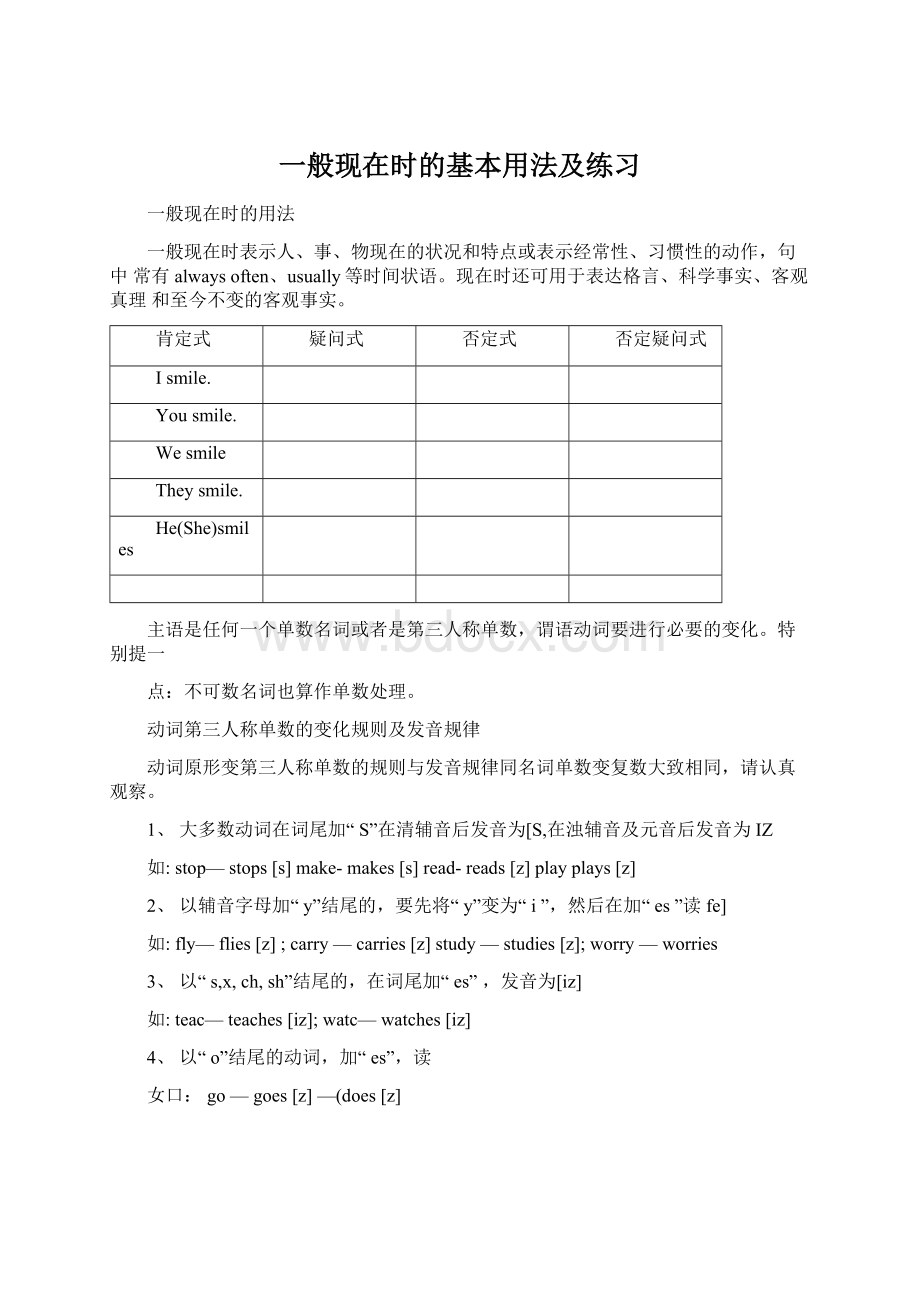一般现在时的基本用法及练习Word文件下载.docx
《一般现在时的基本用法及练习Word文件下载.docx》由会员分享,可在线阅读,更多相关《一般现在时的基本用法及练习Word文件下载.docx(9页珍藏版)》请在冰豆网上搜索。

4、以“o”结尾的动词,加“es”,读
女口:
go—goes[z]—(does[z]
句型
I.疑问
1.对于谓语动词或助动词是be、havecan/may/must等,将这些词移到主语前面。
AreyoustudentsYes,weare./No,wearen你们是一名学生吗?
是的。
我们是一名学生。
/不,我们不是。
IsJaneintheclassroom?
Yes,sheis./No,shei简在这个教室里面吗?
是的,她在。
/不,她不在。
Doesthehousehavetworooms?
Yes,itdoes/No,itdoesr这栋房子里面有两个房间吗?
是的/不,不是。
Isthereanywaterintheglass?
Yes,thereis./No,therei杯子里面有水吗?
是的,有。
/不,没有。
Canyouswim?
Yes,Ican./No,Ican你会游泳吗?
是的,我会。
/不,我不会。
2.谓语动词是实义动词,方法是在主语前加助动词do或does构成,句中动词要改用原型动词。
do用于第一人称和名词复数,does用于第三人称单数和名词单数或不可数名词。
Doyouknowit?
Yes,Ido./No,Idon'
t.你知道这个吗?
是的,我知道/不,我不知道。
DoesshehaveapenYes,shedoes./No,shedoesn'
t.[have这里是实义动词]她有一个钢笔
吗?
Dotheyplaybasketballafterschool?
Yes,theydo./No,theyde他们放学后打篮球吗?
II.否定
1.对于谓语动词或助动词是behavecan/may/must等,后面直接加not。
Iamnotatcollege我不在上大学。
Mr.Wangisn'
t50yearsold.先生不是50岁。
TheJacksonshavenottwoson贾.克森没有两个儿子。
Youmaynotgonow你现在不可能去了。
2.谓语动词是实义动词,是在谓语动词前加donot或doesno,谓语动词改用动词原型
Idon'
thavelunchathome我在家没有吃午餐。
Theydon'
tplaybasketballonthesportsgroun他们不在运动场上打篮球。
Mr.Jimmydoesn'
tknowFrenc吉米先生不会法语。
一般现在时用来表示经常的或习惯性的动作,常与以下的时间状语连用:
often经常,
always总是,sometimes有时,usually通常,everyday/week每天/周等。
He/Sheusuallygoestoschoolbybike通常他/她骑车上学。
Ivisitmygrandparentseveryweek我每个星期都去看祖父母。
He/Sheisalwayslateforclass他/她总是上课迟到。
MyparentsandIsometimesgoouttoea我禾口父母有时出去吃饭。
Itoftenrainshere.这儿常常下雨。
一般现在时用法专练
(A)
I用括号内动词的适当形式填空。
1.Heoften(have)dinnerathome.
2.DanielandTommy(be)membersoftheReadingClub.
3.SheandI(take)awalktogethereveryevening.
4.There(be)somewaterinthebottle.
5.We(notwatch)TVonweekdays.
6.Nick(notdo)hishomeworkonSundays.
7.they(like)theWorldCup?
8.Whattheyusually(do)onholidays?
10.Thegirl(teach)usEnglishonSundays.
n.按照要求改写句子
1.DanielwatchesTVeveryevening改为否定句)
DanielTVeveryevening.
2.Idomyhomeworkeveryday.改为一般疑问句并作否定回答)
youhomeworkeveryday
——No,I.
3.Shelikesmilk.(改为一般疑问句并作肯定回答)
shemilk?
Yes,she.
4.SimonisfromBeijing.同义句改写)
SimonBeijing.
5.Millieiscleveratmath.同义句改写)
Millie
math.
1.I_syoubrotherspeakEnglish?
ABC
2.Doeshelookslikehisfather?
ABC
3.Helikesplaygamesafterclass.
ABC
4.Mr.WuteachsusEnglish.
ABC()
5….Shedoesnh'
rtomeworkonSundays.
ABC()
IV.将下列句子译成英文。
1._桑迪放学后打羽毛球吗?
不.她学习很用功.放学后她总是看书..
_Sandybadmintonafterschool?
No.Shehard.Shealwaysbooksafterschool.
2他在第三中学上学.他每天早上七点上学.
HeinNo.3MiddleSchool.Hetoschoolat7a.m.everyday.
3父亲早晨送我到学校.
Myfathermetoschoolinthemorning.
4.我女儿喜欢看电视和听音乐..
MydaughterTVandtomusic.
5.西蒙朋友的姐姐长大后想当一位歌手.
Simon'
sfriend'
ssistertoasingerwhenshup.
(B)
1.按要求改写下列句子.
1、Sandyhaslonghairinaponytail改为一般疑问句并作肯定回答)
Sandylonghairinaponytail?
Yes,.
2、SimonandDanielaregoodfriends改为否定句)
SimonandDanielgoodfriends.
3、Weareintheschoolfootballteam改为一般疑问句并作肯定回答)
youintheschoolfootballteam?
Y.
4、Amylikesplayingcomputergames改为一般疑问句并作否定回答)
Amyplayingcomputergames?
No,
5、Wegotoschooleverymorning.改为否定句)
Wetoschooleverymorning.
6、Sheisalwaysreadytohelpother改为一般疑问句并作否定回答)
shealwaysreadytohelpothers?
No,.
7、Theearthgoesaroundthesun改为一般疑问句并作肯定回答)
theeartharoundthesun?
Yes,.
8、HespeaksEnglishverywell改为否定句)
HespeakEnglishwell.
9、JohncomesfromCanada对划线部分提问)
WhereJohnfrom?
10、Iliketakingmydogforawalkaftersupper.
Whatyouaftersupper?
.
二.改错
1.LilyandLucydoesn'
twanttocMaarkthard.
2.Mr.GreenlikesworkinChinaverymuch.
3.MymotheroftengototheshoponSundays.
4.Shedoesn'
tlikesbreadorcakes.
5.WhereisJimandKatenow?
6.Therearesomewaterandleavesinthepool.
7.Pleasegiveacolorpencilforme.
8.Theyaren'
tgotoschoolattheweekend.
9.Thedogsitsbetweenthechair.
10.Sheoftenworkshardandgoestobedinnight.
11.MillieisgoodinEnglish.ShespeaksEnglishwell.
12.SheisamemberattheComputerClub.
13.Doyouhelpyourmotherinthehousework?
14.DoSimonoftengohomebyabus?
.
15.Ioftentakebustoschool.
16.Doyouwanttoplaywithusaftertheschool?
17.DanielandDavidwanttoplayonus.
18.Thereisalotsofwaterinthebottle.
19.Wendyhasmuchfriendsinclass.
20.Therearesolotsofpeopleinthehall.
(C)
一用所给动词正确形式填空
1.Heloves(read)newspaper.
2.Nickgoes(swim)everySaturdayafternoon.
3.Simonenjoys(play)football.
4.Mr.Mulikes(walk)afterschool.
5.Amylikes(talk)onthephonewithherfriends.
6.Simonusuallygoes(run)forhalfanhour.
7.Sandyenjoys(look)forthingsontheInternet.
8.Idon'
tlike(danee).
9.Erieisamemberofthe(read)Club.
10.It'
safineday.Whatabouty)badmintoninthepark?
二用适当的介词填空
1.Igotoschoolmyfriends.
2.DanieliscleverEnglish.
3.MillietakesEddieawalkeveryafternoon..
4.KittylivesaflatBeijing.
5.SandysitsKittyandAmy.
6.Hereisapicturemyfamily.Doyouwanttolookit?
7.DoesSimonofteneatarestaurant?
8.theweekend,WendyandKittyplaytennisanhour.
9.Sandyhasblackhairaponytail.Kittyhaslongblackhairbunches.
10.Mr.SmithcomesNewYork.HeisAmerican.
(D)
1.Weoften(play)ontheplayground.
2.He(get)upatsixo'
clock.
3.you(brush)yourteetheverymorning.
4.What(do)heusually(do)afterschool?
5.Danny(study)English,Chinese,Math,ScieneeandArtatschool.
6.Mikesometimes(go)totheparkwithhissister.
7.Ateightatnight,she(watch)TVwithhisparents.
8.Mike(read)Englisheveryday?
9.Howmanylessonsyourclassmate(have)onMonday?
10.Whattimehismother(do)thehousework?
改句子
1.Doyouoftenplayfootballafterschool?
肯定回答)
2.Ihavemanybooks.(改为否定句)
3.GaoShan'
ssisterlikesplayingeabnnis(改为否定句)
4.ShelivesinasmalltownnearNewYork.(改为一般疑问句)
5.IwatchTVeveryday.(改为一般疑问句)
6.Davidhasagoal.(改为一般疑问句)
7.Wehavefourlessons(否定句)
8.Nancydoesn'
trunfa$t肯定句)
9.Mydogrunsfast.
否定句:
一般疑问句:
10.Mikehastwolettersforhim.
11.IusuallyplayfootballonFridayafternoon.
划线提问
12.SuYangusuallywashessomeclothesonSaturday.
划线提问:
13.Mingmingusuallywaterstheflowerseveryday
14.Tomdoeshishomeworkathome.
(E)
I.写出下列动词的第三人称单数形式:
1.wash
match
guess
study
finish
go
snow
carry
2.stop
see
drive
let
keep
join
find
think
teach
catch
3.stay
begin
forget
lie
die
run
prefer
give
ring
dance
hope
II.用所给动词的适当形式填空:
1.I(write)toyouassoonasI(get)toLondon.
2.Hedoesn'
tfeelwellandat)anyfoodthismorning.
3.Henot(see)mecomein,forhe(read)somethingwithgreatinterest.
4.I(let)youhavethebookassoonasI(finish)it.
5.Whilewewaiting(wait)forourteacher,alittleboy(run)uptous.
6.Don'
tmakeanoise.Grandpa(sleep).